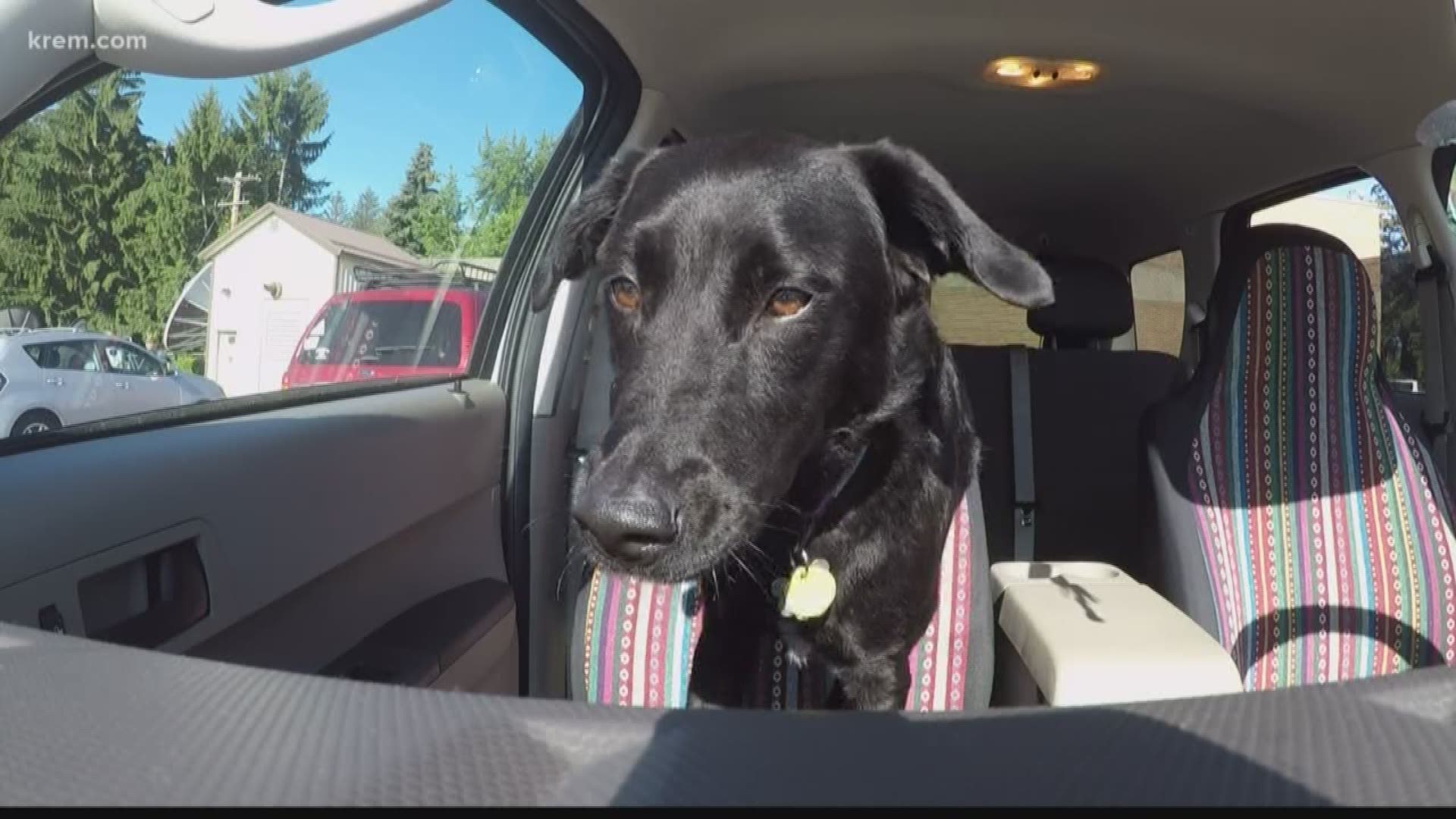SPOKANE, Wash. — A heat wave is bringing 90-degree temperatures to the Spokane area this week, which can pose risks for pets, children and vulnerable adults.
Veterinarians treat animals for heat stroke every summer because they were left in a hot, empty car for too long.
This summer, Dr. Nick Snider with SouthCare Animal Medical Center is asking pet owners to be aware of the dangers of car temperatures.
"The worst case scenario is really death," Snider said.
Heatstroke is an emergency. Signs include heavy panting, agitation, glazed eyes, rapid pulse, staggering, vomiting and a deep red or purple tongue.
According to the National Weather Service, a car sitting in the sun on a 90-degree day will rise well above 100 degrees quickly.
Even on a more mild summer day, it does not take long for temperatures to become dangerous for pets. Snider says that animals are less tolerant of high temperatures, meaning they reach heat stroke responses faster than humans do.
Cracking windows does not help reduce temperatures enough to make any car safe for an animal.
"It's just better if we have errands to run - I know we love them, we love them to come wherever we go - for their health it's better for them to stay home," Snider said.
If there is an animal in distress, civilians in both Washington and Idaho cannot legally break a car window to help the animal.
According to the Animal Legal & Historical Center, 28 states provide civil immunity, meaning protection from being sued, for a person who rescues a distressed animal from a vehicle. Most laws provide that the animal must be confined or unattended in a parked or stationary vehicle.
Oregon is among 12 states that have recently enacted laws allowing anyone to rescue a distressed animal.
Snider has some tips on what Washington and Idaho residents can do if they see an animal trapped in a hot car.
"I'd go into the store. I personally do, and tell somebody that can make an announcement. You know, try to help the animal out as much as possible," Snider said.
If that is not enough to save the animal, police advise you to call 911 or non-emergency dispatch. You can also call a local animal shelter to respond.
In the Spokane area, you would call the Spokane County Regional Animal Protective Service at 509-477-2532.
In addition, take detailed notes of what you see. Police say that can only help when officers get to the scene.
Under Idaho's animal cruelty (animal care) law - Section 25-3504 you could be cited for leaving a dog in hot car. The statute also gives law enforcement or animal control officers the authority to "take possession of the animal cruelly treated and provide care," essentially allowing officers to break into cars to save pets.
In Washington, it is a class 2 civil infraction to leave an animal unattended in a car or enclosed space where they could be harmed or killed by exposure to “excessive heat, cold, lack of ventilation, or lack of necessary water.”
Under the law, law enforcement or animal control officers are authorized to enter the vehicle or enclosed space “by any means reasonable” if there is no one present who has access to the vehicle. Officers are not liable for any damage to the vehicle as a result.
KREM has compiled some tips for helping a pet if they are overheated and keeping them cool as the temperatures soar.
- If an animal is overheated, place it in a cool place and apply cool (not cold) water all over its body. Apply ice packs or cold towels only to the head, neck and chest. Let it drink small amounts of cool water or lick ice cubes and go immediately to a veterinarian. Do not wait to see if your pet improves - it's always better to be safe than sorry.
- If your pets spend time in the yard, make sure they have access to shade trees or a covered patio. Remember, newly clipped animals and animals with white fur are more likely to get sunburned. Dogs often enjoy having cool water on their feet to help them cool down. Some dogs enjoy walking through or even lying in a child's wading pool.
- Never leave your animal chained or penned up directly in sunlight. Provide a shady area where the animal can retreat to such as a dog house, porch or shady tree, and always provide cool water.
- If you must leave an animal indoors, open the windows, keep a fan running, provide plenty of water, and if possible, leave them in a cool location.
- Never leave dogs or cats unattended in a closed, locked car. Temperatures can exceed 130 degrees in a matter of minutes. Animals do not perspire like humans; they cool themselves through their lungs by panting. Hot air can lead to brain damage or death. Also, be aware that vinyl seats in vehicles get hot under animals feet and prevents them from perspiring through their paws. Remember, with the movement of the sun, a vehicle originally parked in the shade may soon be in direct sunlight.
- Avoid overexerting your animal in hot weather. Exercise is fine when taken in moderation, but obesity, old age, underlying disease and previous bouts of heat stroke can predispose an animal to the condition.
- Feathered friends: Take caution and place the bird's cage away from direct sunlight during the intense heat of the afternoon. Provide water and fruits and vegetables with high moisture content.
KTVB and KING staff contributed to this report.

